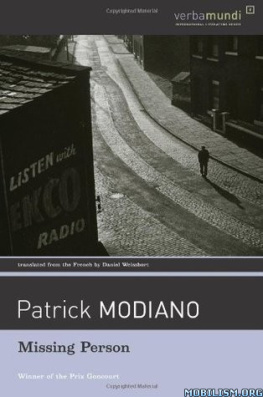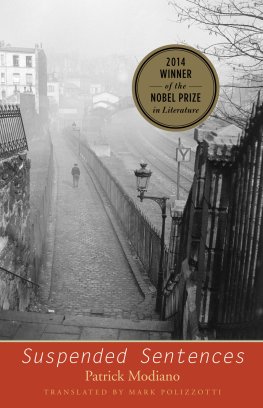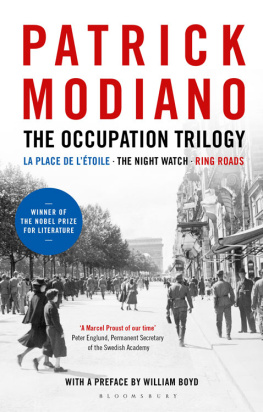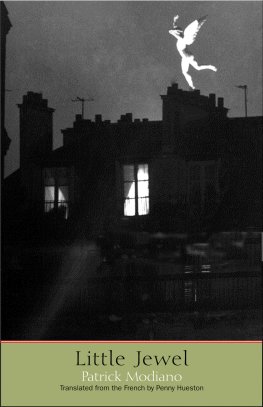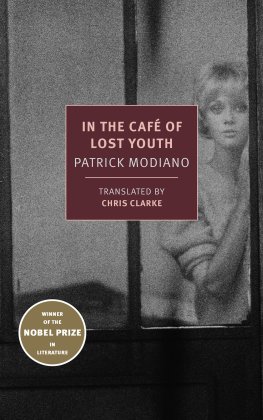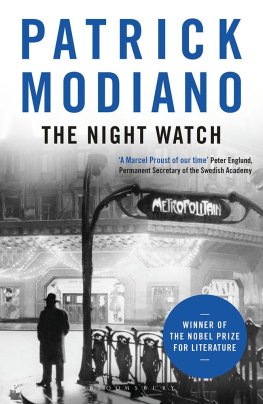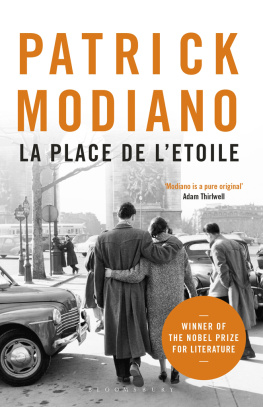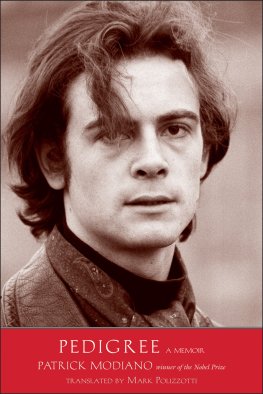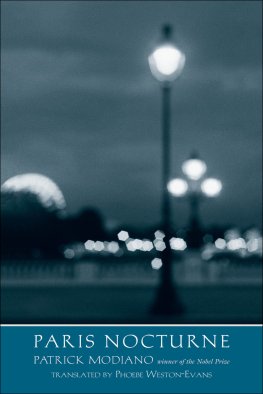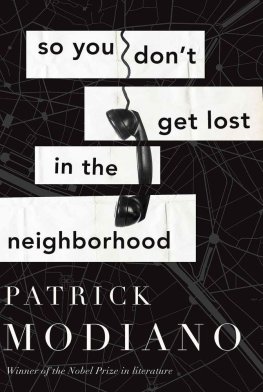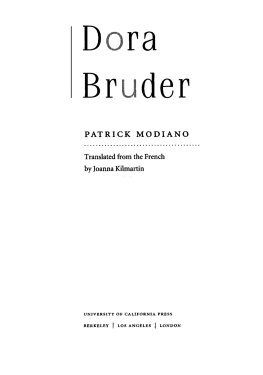PATRICK MODIANO
MISSING PERSON
translated from the French by Daniel Weissbort
First published in Great Britain 1980
First published in French 1978, under the title Rue des Boutiques Obscures ditions Gallimard, 1978
Modiano, Patrick, 1945-
[Rue des boutiques obscures. English]
CONTENTS
For Rudy
For my father
I AM NOTHING . Nothing but a pale shape, silhouetted that evening against the caf terrace, waiting for the rain to stop; the shower had started when Hutte left me.
Some hours before, we had met again for the last time on the premises of the Agency. Hutte, as usual, sat at his massive desk, but with his coat on, so that there was really an air of departure about it. I sat opposite him, in the leather armchair we kept for clients. The opaline lamp shed a bright light which dazzled me.
"Well, there we are, Guy... That's it...," said Hutte, with a sigh.
A stray file lay on the desk. Maybe it was the one belonging to the dark little man with the frightened expression and the puffy face, who had hired us to follow his wife. In the afternoon, she met another dark little man with a puffy face, at a residential hotel, in Rue Vital, close to Avenue Paul-Doumer.
Thoughtfully, Hutte stroked his beard, a grizzly, close- cut beard, but one which spread out over his cheeks. His large, limpid eyes stared dreamily ahead. To the left of the desk, the wicker chair where I sat during working hours. Behind Hutte, dark wooden shelves covered half the wall: there were rows of street-and-trade directories and yearbooks of all kinds, going back over the last fifty years. Hutte had often told me that these were the essential tools of the trade and that he would never part with them. And that these directories and year-books constituted the most valuable and moving library you could imagine, as their pages listed people, things, vanished worlds, to which they alone bore witness.
"What will you do with all these directories?" I asked Hutte, taking in the shelves with a sweeping gesture.
"I'm leaving them here, Guy. I'm keeping the lease on the apartment."
He cast a swift glance around. The double door leading into the small adjoining room was open and one could see the worn, velvet-covered sofa, the fire-place, and the mirror in which the rows of year-books and directories and Hutte's face were reflected. Our clients often waited in this room. A Persian carpet protected the parquet floor. An icon hung on the wall, near the window.
"What are you thinking about, Guy?"
"Nothing. So, you're keeping the lease?"
"Yes. I'll be coming back to Paris from time to time and the Agency will be my pied--terre"
He held out his cigarette case.
"I think it's less sad if I keep the place as it is."
We had been working together for over eight years. He himself had started this private detective agency in 1947 and had worked with quite a number of other people before me. Our business was supplying clients with what Hutte called "society information." It was all, as he was fond of repeating, a matter of dealings between "society folk."
"Do you think you'll be able to live in Nice?"
"Of course."
"You won't get bored?"
He blew out some smoke.
"One has to retire eventually, Guy."
He rose heavily. Hutte must be over six feet tall and weigh more than 200 pounds.
"My train's at 10:55. We have time for a drink."
He walked ahead of me into the corridor that leads to the entrance hall, an odd, oval-shaped room with pale-beige- colored walls. A black portfolio, so full that it would not close, was standing on the floor. Hutte picked it up. He carried it, one hand underneath.
"You don't have any luggage?"
"I sent everything on ahead."
Hutte opened the front door and I switched off the hall light. On the landing, Hutte paused a moment before shutting the door and the metallic sound cut me to the quick. It marked the end of a long period in my life.
"It is a crying shame, isn't it Guy?" said Hutte, and he took a large handkerchief from his coat pocket and mopped his brow.
The black marble rectangular plaque, with its gilt and pailletted lettering, was still there:
C. M. H UTTE Private Enquiries
"I'm leaving it," said Hutte.
Then he turned the key in the lock.
We walked along Avenue Niel as far as Place Pereire. It was dark and, though winter was not far off, the air was still mild. In Place Pereire, we sat down on the terrace of the Hortensias. Hutte liked this caf, because of the caned chairs - "just like the old days."
"And what about you, Guy, what are you going to do?" he asked, after he had gulped down some brandy and soda.
"Me? I'm following something up."
"Following something up?"
"Yes. My past."
I had said this rather portentously and it made him smile.
"I always thought that one day youd try to find your past again."
Now he was serious and I was touched by it.
"But look here, Guy, I wonder if it's really worth it."
He fell silent. What was he thinking of? His own past?
"I'll give you a key to the agency. You can go there from time to time. I'd like that."
He held out a key, which I slid into my trouser pocket.
"And call me in Nice. Let me know what's happening, how you're getting on ... with your past..."
He rose and clasped my hand.
"Shall I go with you to the station?"
"No, no ... It's so sad..."
With a single stride he was out of the caf, not turning around, and I felt an emptiness all of a sudden. This man had meant a lot to me. Without him, without his help, I wonder what would have become of me, ten years back, when I was struck by amnesia and was groping about in a fog. He had been moved by my case and, through his many contacts, had even managed to procure me a legal identity record.
"Here," he had said, handing me a large envelope which contained an identity card and a passport. "Your name is 'Guy Roland' now."
And this private detective whose professional services I had sought in uncovering witnesses or traces of my past, had added:
"My dear 'Guy Roland,' from here on don't look back, think only of the present and the future. How about working with me?..."
If he felt drawn to me, it was because he too - I learned later - had lost track of himself and a whole section of his life had been engulfed without leaving the slightest trace, the slightest connection that could still link him with the past. Because what was there in common between this tired old man whom I watched moving off into the night in his threadbare coat and carrying a big black portfolio, and the handsome tennis player of days gone by, the flaxen-haired Baltic Baron, Constantin von Hutte?
H ELLO . Is this Mr. Paul Sonachidze?"
"Speaking."
"This is Guy Roland ... You know, the ..."
"Yes, of course! I know. Can we meet?"
"If you will..."
"What about... this evening, around nine, Rue Anatole- de-la-Forge?... Is that all right?"
"Yes."
"I'll expect you. See you later!"
He hung up abruptly and the sweat was running down my temples. I had drunk a glass of cognac to steady myself. Why did a harmless act like dialing a phone number cause me so much anguish?
There were no customers in the bar, in Rue Anatole-de-la-Forge, and he was standing behind the counter, dressed in his outdoor clothes.
"You're in luck," he said. "I have every Wednesday evening off."
He approached me and put his hand on my shoulder.
"I've thought a lot about you."
"Thanks."
"It's really been on my mind, you know..."
I wanted to tell him not to worry, but the words failed me.
"I've come to the conclusion that you must have been a friend of someone I used to see a lot of at one time ... But who?"
Next page
